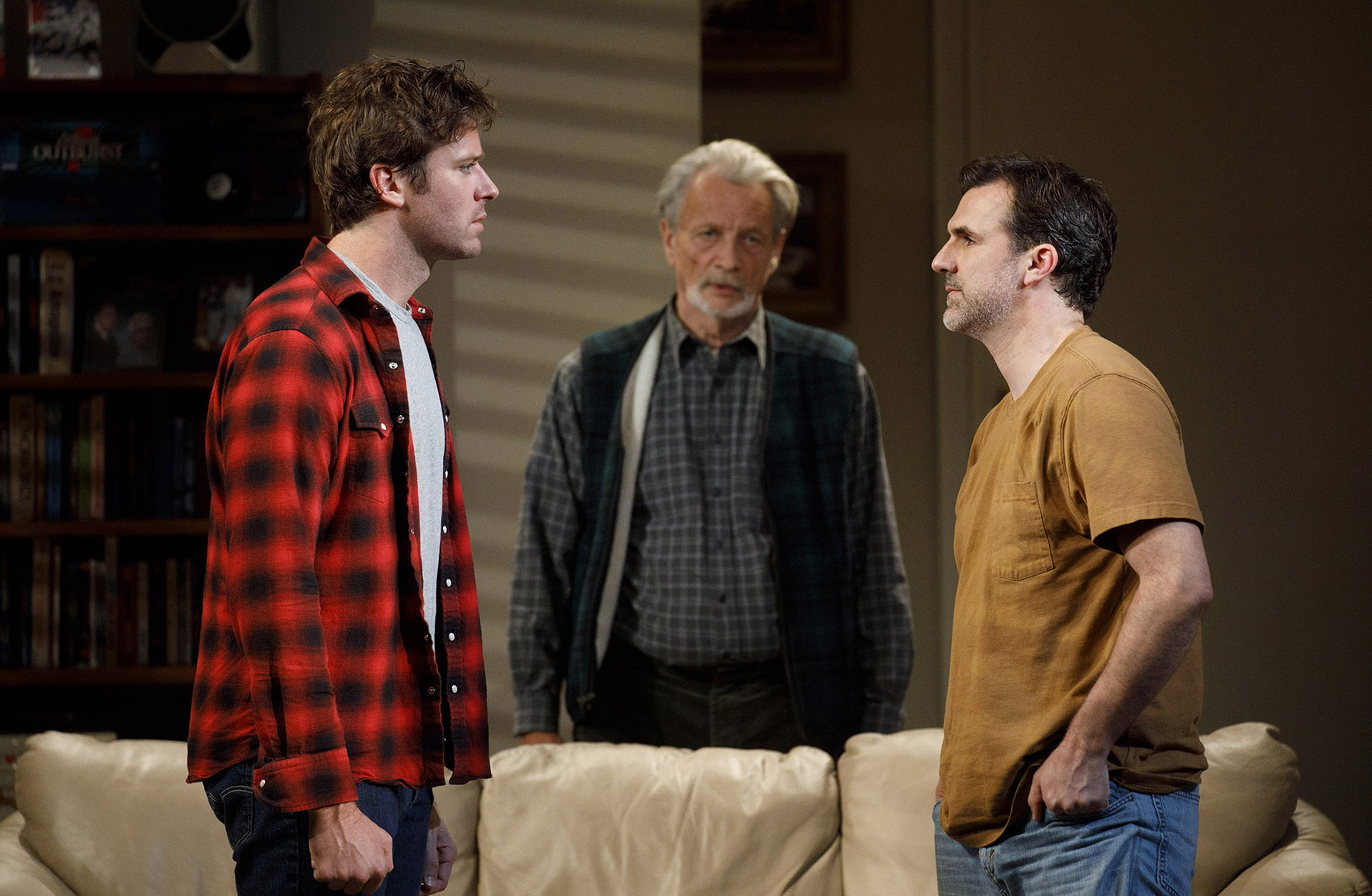Straight White Men: Broadway comedy examines labels

Playwright Young Jean Lee makes her Broadway debut with Straight White Men, a comedy that has all the ingredients of a domestic sitcom. The setup, much like the 1960s TV series, “My Three Sons,” centers around a midwestern engineer and his family.
Leading us back to that civilization as if it were an archeological dig are our two nonbinary guides, Kate Bronstein and Ty Defoe, aptly named Person in Charge I and II. They circulate through the audience before the show, introducing themselves and offering us ear plugs for the music that is blasting and continues until the play begins.
Now it’s Christmas and dad’s three 40-something sons are home for the holidays. Jake (Josh Charles), a successful banker recently divorced, and his brother Drew (Armie Hammer), a college professor and novelist, engage in the roughhousing and boy’s play of their childhood. When they can, they get brother Matt (Paul Schneider) to join them, as well as their dad, Ed (Stephen Payne), who is as dynamic and virile as his sons are.
That the performances are so entertaining is the bread and butter of the show. In fact, these straight white men, all gorgeous to look at, are also terrific dancers who enjoy a good hoax.
As directed by Anna Shapiro, behaviors that could appear quite offensive, such as the conversation about gay chicken — rubbing one’s balls on someone’s face — are played down here. One notices the fun-loving spirit, rather than the aggressive male behavior. In fact, these guys would probably do well in a gay environment. So much for labels.
It’s this kind of labeling that provokes Jake and Drew to probe their brother Ed, a Harvard grad, who has returned to live at home and works at a job that pays the minimum wage. His rejection of labels is only one side of the story, at least to his brothers, who fear that his inability to assert himself speaks to a deep depression.
Still, it’s Matt’s existential quest which puts the story in perspective. A white man who has invested his life in protecting the civil liberties of others, Ed can’t it make it work. The labels, be they “Harvard Grad,” or “white and privileged” are too constricting.
It’s also what Person in Charge 2 tells us at the onset of the show, “Kate and I are well aware that it can be upsetting when people create an environment that doesn’t take your needs into account.” Indeed, there is a sense in which each of these family members dwells in situations that aren’t as successful as they may want us to believe.
Marked by the strength of the acting, the production is engrossing, with the physical life of these four charismatic men creating the life of the story. Armie Hammer (“Call Me By Your Name”), Josh Charles (“The Good Wife”), and Paul Schneider, give highly charged physical performances. Stephen Payne, with his resounding voice, makes for a very appealing dad.
In this family room, designed by Todd Rosenthal, with plaid shirts and pajamas by Suttirat Larlarb, and friendly lighting by Donald Holder, the sitcom unfolds.
Pretty Woman
Pop star Bryan Adams and songwriting partner Jim Vallance bring their 40-year collaboration to the score of Pretty Woman: The Musical. They’ve written some sweet ballads, and duets that serve the romantic story convincingly enough.
More dominant, however, is the frenzied feeling of songs, like Welcome to Hollywood, that boast a cacophony of noise, accompanying the characters’ loud expectations. This may be the place where people pursue their dreams, but until they catch them, there is an awful lot of discomfort and craziness to get through.
Adapted by Garry Marshall, who directed the 1990 movie, and J.F. Lawton, who wrote the screenplay, this tale about the golden hearted hooker, and the billionaire who falls for her is more than just familiar. Given that it was a breakthrough movie for the young Julia Roberts, it’s difficult to imagine anyone else stepping into Vivian’s shoes. Regardless, Samantha Barks creates a fresh, rosy-checked hooker. Her Vivian has intelligence and backbone.
Andy Karl as Edward, the role Richard Gere created on screen, is the leading man of the day, having received last season’s Tony Nomination for Groundhog Day, which followed on the heels of his Broadway appearance in On The Twentieth Century and his titular role in the Broadway musical, Rocky. Here he woos the girl who opens his mind, transforming him from a cutthroat businessman to a humanized citizen of the world in a fashion that meets with our 21st Century expectations, of course.
Still, the most resounding voice on the stage is Orfeh’s. She’s off the charts, morphing comedically from a snide, street-smart sex worker to a student at the Police Academy. Similarly, Eric Anderson, doubling as a street barker of Hollywood dreams and a soft-hearted manager of the Beverly Wilshire Hotel, keeps the action moving. On the other hand, Jason Danieley as Stuckey, Edward’s lawyer, is a lot like his name — venal and greedy.
That the production maintains such high energy is the work of director/choreographer Jerry Mitchell. David Rockwell’s sets keep the pace with quick, seamless transitions from street scenes to bedrooms.



